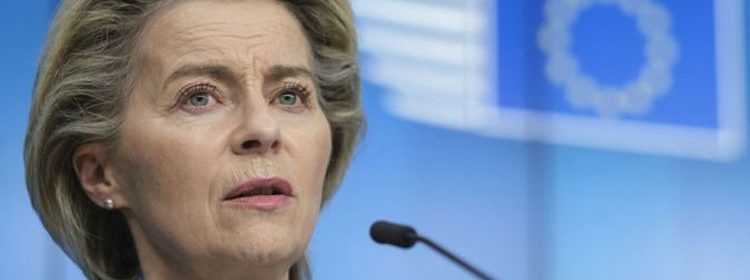EU power grab: Chilling analysis show how bloc dominates lives of its citizens

Brexit: Ann Widdecombe tells Nigel Farage that he 'won'
We use your sign-up to provide content in ways you’ve consented to and to improve our understanding of you. This may include adverts from us and 3rd parties based on our understanding. You can unsubscribe at any time. More info
And the report, prepared by pro-Brexit think tank Facts4EU, argues there is now scarcely any area of day-to-day existence into which the bloc has not inserted itself. The report charts the rise of the bloc from its inception in 1957, when it was known as the European Steel and Coal Community, and consisted of Belgium, France, Italy, Luxembourg, the Netherlands and West Germany.
The UK joined in 1973, with a referendum on whether to stay in or not held two years later.
Facts4EU’s report states: “From its first inception in 1957, Brussels started to stretch its claws.
“From being a trading bloc it took on new powers, starting with legislating on environmental controls.”


The European Parliamentary Assembly was created in 1958, and renamed the European Parliament on March 30, 1962.
The report explains: “Until July 1978 the Parliament was filled by appointed delegates but an Act then came into force and MEPs started to be elected by popular mandate the following year.
“Then – as now – this Parliament had no powers to introduce new laws. These power were – and still are – held by the EU Commission which is not elected by the people.”
JUST IN: Covid ‘cover-up’: Report claims virus DID escape from Wuhan lab

In 1970, coinciding with the year the UK applied to join the bloc, the EU pushed through a new law stating that all fishing rights of member states would be shared in a move which was to have major repercussions.
The report states: “The reason was simple: the richest waters in Europe were those around the UK.
“By rushing through a new law the EU guaranteed that the UK would cede its waters on the day it joined.
DON’T MISS
EU civil war breaks out over move to grant UK ‘diplomatic win’ [EXCLUSIVE]
Boris hints Sunak has LOST Covid travel wars as he refuses to cave [REVEALED]
Biggest Brexit losing EU countries exposed in new report [REPORT]


“There was no legal justification in the Treaty for this power grab but the EU went ahead and did it anyway.”
Facts4EU also highlights then-Prime Minister Ted Heath’s insistence that concerns about the UK sacrificing its sovereignty and independence were “completely unjustified”, in his words.
The report points out: “He knew full well that the Act of Accession would automatically cede independence and sovereignty to Brussels.
“Even back in 1973, the mere act of joining the ‘Common Market’ meant signing up to an ever closer union.”

The ratification of the Single European Act in 1987, bringing with it the unveiling of a symbolically significant EU flag and a European anthem, as well as the Maastricht Treaty which officially named the bloc the European Union, are also highlighted in the report.
Commenting, Facts4EU editor-in-chief Leigh Evans said: “Facts4EU.Org could write a book on the subject of the EU and its power grabs.
“The EU now has supreme power over large parts of everyday life for citizens in the EU, from deciding that your vacuum cleaner can only clean at half the suction you were used to, to deciding what you can eat, to deciding what social policies your own government can pursue.
“There is now scarcely any aspect of life which is untouched by the EU’s powers.”

As for whether what he termed the “continual acquisition of increasing powers by Brussels” was benign, Mr Evans said: “Unfortunately, after six years of intensely studying the EU on a seven day-a-week basis, we do not believe it is.
“On the day after the majority of the British public voted to leave this sclerotic empire, the EU Commission President stated: ‘This is not an amicable divorce.’
“Given that he said this within hours of the result having been declared, this was clearly a statement of hostile intent and this is exactly how the EU has behaved ever since – with hostility.
“We suggest it epitomises the nature of this now-powerful beast.”
Source: Read Full Article
